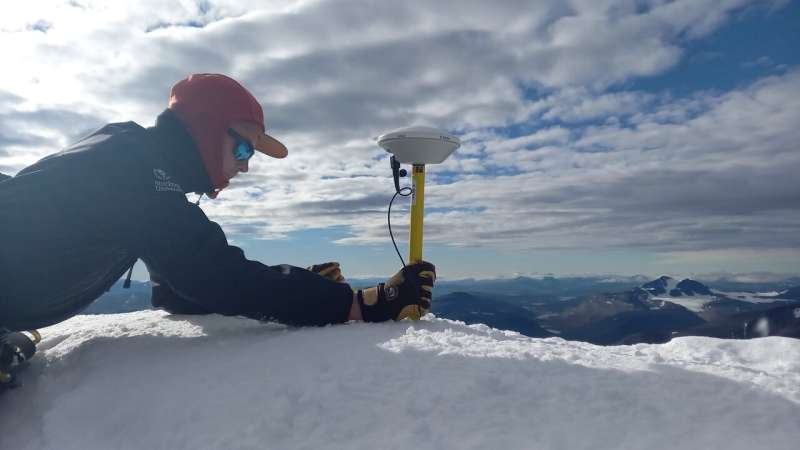Kebnekaise's southern peak once again lower than the northern peak

Since September 2019, Sweden has had a new official highest point. Researchers at Stockholm University's research station in Tarfala established that the southern peak of the Kebnekaise mountain, at 2095.6 meters, was now lower than the northern peak, with a height of 2096.8 meters. Scientists had long predicted that the south peak, consisting of a snow-covered glacier, would shrink due to the warmer climate, and thus fall below the height of the north peak, the summit of which consists of rock, which does not change in elevation.
The annual measurement of the height of Kebnekaise's southern peak was carried out on September 9, 2022. The elevation was measured as 2094.6 meters above sea level, the same height as measured at the end of the summer 2021.
"In contrast to reports on extreme glacier mass loss in the Alps, glacier mass loss in Sweden was moderate during the summer of 2022, and Kebnekaise's southern peak was able to maintain its elevation," says Nina Kirchner, director of Tarfala Research Station (TRS) at Stockholm University.
The annual measurement of the southern peak is carried out by staff from TRS, who this year climbed the southern peak instead of visiting it by helicopter. "Species found here in the Arctic are already living in difficult conditions and climate change adds extra pressure on them. The climate crisis can be seen as an evolutionary process, created by humans, and we do our best to avoid escalating it," explains Annika Granebeck, operative station manager at TRS.
TRS is also responsible for reporting mass balance data from Swedish glaciers to the World Glacier Monitoring Service in Switzerland, where information about the state of glaciers worldwide is gathered.
"While 2022 again saw a continued trend of negative mass balance among the glaciers studied by TRS, mass losses were subdued compared to recent years. We thus hoped to find little change at the southern peak, too, and are happy to confirm this with our measurement," adds Jamie Barnett, research engineer at TRS.
Provided by Stockholm University





















